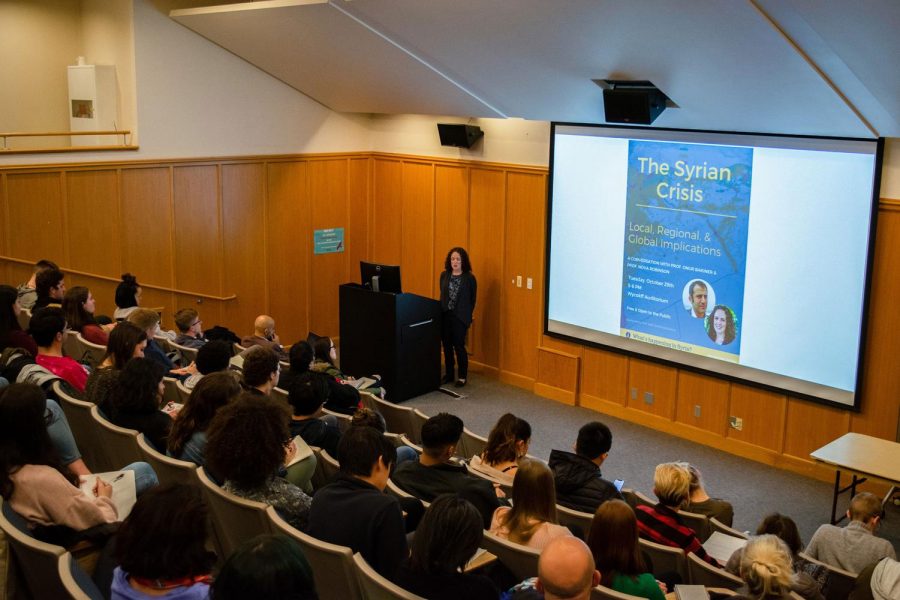Syria Panel: An Insight Into the Current Crisis
Professor Nova Robinson speaking to the students about the global impacts of the Syrian Crisis
The College of Arts and Sciences held a panel on Oct. 29, inside the Wyckoff auditorium where two Seattle University professors, Nova Robinson and Onur Bakiner, informed the crowd on the current political climate in Syria.
Robinson and Bakiner both have background education on the Middle East. Robinson is a historian who focuses on women’s history in the region, and Bakiner is a political science professor who focuses on justice and human rights.
Syria has been in internal conflict since 2011, resulting in eight years of war with over 511,000 civilian casualties. The country is currently under an authoritarian regime led by Bashar Al-Assad, a position he inherited from his father.
Throughout the eight-year war, Assad has been accused of multiple human rights violations—the most outstanding being the use of chemical weapons against his own people resulting in mass casualties of civilians.
Throughout the conflict, over six million people have been displaced within Syria, and more than three million have been displaced to different countries.
“Somewhere between three and a half to four million Syrians are estimated to live in Turkey right now. So for our country of 80 million, that’s about 5% of the population,” Bakiner said.
Rowyn Henning, a second-year economics major at Seattle U who attended the event, was happy with everything he learned from the discussion. Originally, Henning was not interested in attending as it was a requirement by one of his international studies classes, but afterwards expressed that he left feeling impacted.
“The information provided by Professor Robinson and Bakiner was incredibly informative and enriching to my understanding of the topic,” Henning said. “It’s valuable to recognize that on-campus events like these do have an educational impact on those who attend.”
Robinson expressed that she wanted to be a part of the panel as it was held to answer questions for students who may not be fully informed about the situation in Syria.
“The idea for it came out of a conversation that I had in a class that I was teaching about what’s happening in Syria and I realized a lot of students had questions,” Robinson said. “I thought if these students have questions then other students have questions so why not put together a panel for people to be able to raise questions.”
Relevant news about Syria is currently focused on the U.S. as the army recently pulled out of the region. Although this has little impact on the United States itself, it did have a huge impact on the people of Syria who remain in the country.
“I think that the U.S. deciding to pull out of Syria is atrocious,” Robinson said.
Although Bakiner focused mostly on educating the crowd about the role Turkey has had in the Syrian war, he expressed similar thoughts about the U.S. stepping out.
“It was particularly wrong to have withdrawn without prior warning or without first reaching some sort of ceasefire or peace with the actors on the ground,” Bakiner said.
Given the geographical distance of Syria to the United States the question on how Seattle U students could help came up at the event. According to Robinson, there are several ways and they are mostly local.
Refugees coming from foreign countries are only given three months of support before they have to support themselves, so helping local refugee agencies make welcome kits is very useful.
Additionally, at the end of each school year, students have lots of stuff they don’t want or need. Robinson suggested that students could create a campus-wide drive that would ultimately help those just integrating into the community.
Moving forward, Bakiner believes the best people can do from here is to keep the conversation going on the situation in Syria so it is not forgotten.
“The conflict in Syria right now looks intractable, but it doesn’t have to be and I think the international community at one point had a constructive role to play and look for an opening to play a more constructive role.”
The editor may be reached at [email protected]











